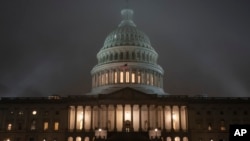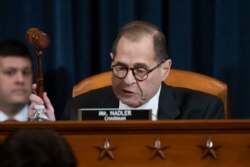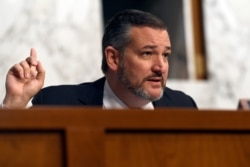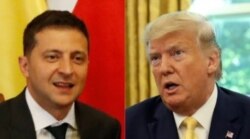The rancor from the imminent impeachment of President Donald Trump played out on Sunday's news talk shows in the U.S., with no political agreement on the merits of the case against him.
The Democratic-controlled House of Representatives is set by mid-week to make the Republican president only the third American leader to be impeached in the country's 243-year history, even though his conviction at a trial next month in the Republican-majority Senate and removal from office remains unlikely.
"We will have done our duty in the House," Congressman Jerrold Nadler told ABC's "This Week" show, two days after the House Judiciary Committee he chairs approved two articles of impeachment against Trump, sending the allegations to the full House, with a Wednesday vote possible.
The Democratic-majority panel, over unified Republican opposition, accused Trump of abusing the power of the presidency by soliciting Ukraine to investigate one of his chief 2020 Democratic challengers, former Vice President Joe Biden, and then obstructing congressional review of his actions by refusing to turn over thousands of pages of documents to impeachment investigators and blocking key Trump aides from testifying.
Trump has ridiculed the impeachment effort, again Sunday describing his request to Ukrainian President Volodymyr Zelenskiy for the politically tinged investigation as "a PERFECT phone call."
On Twitter, he recalled his conversation: "'Can you do us (not me. Us is referring to our Country) a favor.' Then go on to talk about 'Country' and 'U.S. Attorney General.' The Impeachment Hoax is just a continuation of the Witch Hunt which has been going on for 3 years. We will win!"
Nadler contended, "This president conspired, sought foreign interference in the 2016 election. He is openly seeking foreign interference in the 2020 election. We cannot permit that to continue."
"This is a crime in progress against the Constitution and against the American democracy," Nadler said.
On the same show, Congressman Adam Schiff, chairman of the House Intelligence Committee that held weeks of hearings on Trump's alleged wrong-doing, asked, "Why won't Republicans do their duty" to hold Trump accountable? He said if Trump's immediate predecessor, Democratic President Barack Obama, had made the same overtures to Ukrainian President Volodymyr Zelenskiy for a politically tinged investigation, "I would vote to impeach him."
Republican Sen. Ted Cruz, a staunch Trump supporter who would be be one of 100 jurors to hear the case against Trump at a Senate trial, contended on the same ABC show that Nadler and Schiff were engaged in "partisan attacks" against Trump and said there is "zero evidence" of a crime committed by Trump.
Cruz argued that "the House Democrats hate the president." He said it was "perfectly within the duties of the president" to ask that Zelenskiy investigate Biden and his son Hunter Biden's role as a board member of a Ukrainian natural gas company, Burisma, and a debunked theory that Ukraine meddled in the 2016 election to undermine Trump's campaign. The U.S. intelligence community concluded that Russia interfered in the election to help Trump win.
On CNN, another Trump supporter, Sen. Rand Paul, called the president's impending impeachment a "very partisan thing," saying Democrats have "decided to criminalize politics."
Trump made his request for the Biden investigations to Zelenskiy at a time when he was temporarily blocking $391 million in military aid to Ukraine that Kyiv wanted to help fight pro-Russian separatists in eastern Ukraine. He released the money in September without Zelenskiy opening any investigations of the Bidens.
Cruz said Trump's request to Zelenskiy for the Biden investigations was justified because the elder Biden, when he was vice president, was "publicly bragging" that he withheld aid that Ukraine wanted at the time until a prosecutor who had once investigated Burisma was fired.
Democrats say the difference between the two cases is that Biden's request for the ouster of the Ukrainian prosecutor, deemed weak on corruption by the West, was part of U.S. policy supported by the European Union, while Trump's bid for the Biden probe was linked to U.S. elections, in particular related to a 2020 rival when Trump is seeking a second term in the White House.







